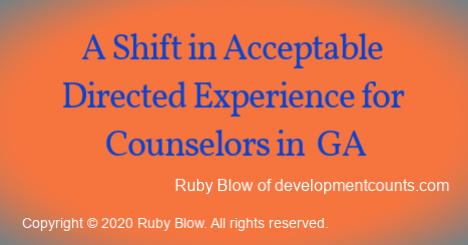Pursuing Counseling Licensure in the State of Georgia
It can be very confusing pursuing licensure in Georgia. It is up to every applicant for associate or full licensure to review and follow the board rules and Georgia laws. This blog post is dated April 12, 2017. I am not on the composite board nor do I speak for the board. I have not copied the board rules in this blog post. I am also not charging a fee or profiting from this blog content.
I am able to write this content because I make every attempt to follow the board rules and I am intimately familiar with both the current rules and the upcoming board rule changes in 2018. You should go and review the board rules yourself at http://rules.sos.ga.gov/gac/135.
The tips I am providing below are based on my understanding of the board rules and based on the guidance I have provided to 100s of students, colleagues and applicants over the years. Licensing rules and how they are applied change rapidly. The Georgia Composite Board of Licensed Professional Counselors, Social Workers and Marriage and Family Therapists has the final say on board rules, applications submitted to the board and how they will govern licensees.
Below is my summary of what you need to do to become an APC (Associate Professional Counselor License)
- Download APC application from the GA Composite Board for Professional Counselor, Social Workers and Marriage and Family Therapists. There is an application fee. ($100)
- Master’s degree in Counseling (or related field) after September 30, 2018. Your graduate program must be CACREP (Council for the Accreditation of Counseling and Related Education Programs) accredited or substantially similar. http://www.cacrep.org/
- NCE (National Counseling Exam) or NCMHCE (National Clinical Mental Health Counseling Exam) scores (register through your graduate program or request to register in your application to the GA Composite Board when you are submitting your APC or LPC application). If you are approved, then the board will send you additional information about how to register for the exam via the NBCC. The process to register for the exam once you submit your application to NBCC will take a minimum of 8 weeks.
- Your practicum/internship needs to be a minimum of 600 hours (effective September 30, 2018). It counts toward your LPC requirements. The current rule is a minimum of 300 hours.
- Submit a copy of your sealed transcript. I suggest that you have it sent to you and then mail it with your application. Do not open it.
- You will need to provide two references from supervisors or instructors. There is a form that you must use. It is in the application. The person(s) providing the references must sign across the seal of the envelope.
- Employment or contract work in the field. You will complete a 5 page contract affidavit. It is part of the APC application. Volunteer work is allowed, however, the set up and structure must be the same as employment. They must complete the plan for direction forms.
- Director – a person who oversees your work and identifies it as counseling and as paid work or structured volunteer work. They also provide administrative supervision and make sure you are receiving clinical supervision.*The board has specific definitions for this role. Please go view it.
- Supervisor – a person who provides professional guidance and clinical feedback and oversight of your cases. You discuss clinical, ethical and professional development issues with your supervisor. Your supervisor needs to be a Certified Professional Counselor Supervisor (certified by the Licensed Professional Counselors Association of Georgia) lpcaga.org. Or an ACS (Approved Clinical Supervisor) approved via the National Board of Certified Counselors and the Center for Credentialing and Education. NBCC – CCE. www.nbcc.org and http://www.cce-global.org/. Supervisor certification is required by the composite board for supervision entered into after September 30, 2018. *The board has specific definitions for this role. Please go view it.
- Currently a supervisor must be at least 3 years post licensure on a Master’s degree; 2 post-licensure years with a Specialist degree; and 1 year post-licensure with a Doctorate degree.
- Half of your supervision must be with a supervisor who is an LPC. So that means if you have a Master’s degree, then 2 years must be with a supervisor who is an LPC.
How do you Maintain your APC or your LPC?
- If you are an APC, you must update the board when you have changes in employment, direction or supervision (within two weeks of the change). You use the forms of the contract affidavit portion of the APC application to do so.
- APC’s like LPC’s must obtain 35 hours of continuing education every 2 years.
- If you receive your license (APC or LPC) after October or later of the odd year (for example, October 2017), you will still have to renew your license in September prior to the 30th but you will not have to obtain the continuing education hours.
- Renewal is due September 30th of even years. For example, September 30, 2018 is when your license expires, then again on September 30, 2020 and so on….
- Renewal involves a fee. You can renew online. You will have to set up an account.
- Obtain 35 hours of continuing education.
- Five of those hours must be ethics. (They cannot be obtained online.)
- 15 of the 30 hours must be core hours. Core means that it is approved by a counseling organization (LPCA or NBCC or a counseling graduate program)
- The remaining 15 can be related. Related hours means that the workshop content has been approved for Social Workers, Marriage and Family Therapists, psychologists etc… by one of their professional associations or academic departments.
- Only 10 hours of continuing education may be obtained online.
- Prior to engaging in telemental health counseling, you must complete at least 6 continuing education hours in telemental health counseling.
- If you are a supervisor, you need an additional 3 hour of telemental health supervision training. The board will ask if you have completed this in the contract affidavit that is part of the APC application and updates.
Tips for Advancing from APC to LPC (Independent Licensure)
- Submit an application after you have met the directed experience hours required (600 per year) and the supervision criteria (30 hours per year). After September 30, 2018 the requirement is 1,000 hours of directed experience and 35 hours of supervision per year.
- There is another application fee ($100). The fees could change but the haven’t for a long time.
- Try to separate direction from supervision if possible. There are many ethical dilemmas that arise when your boss (director) is also your clinical supervisor. A person trained in supervision ethics will try to divide this role as much as possible.
- Get a supervisor from the LPCA-GA, CPCS Registry. lpcaga.org. Supervision is a service and it typically requires a fee. Free supervision is similar to free counseling. It can compromise the quality of the work that occurs. Supervision involves a supervision agreement and evaluation of your clinical and professional skills and competencies.
- Begin supervision as soon as you obtain employment in the field.
- After you graduate from a qualifying degree program, have a job in the field and have arranged supervision, you must obtain 1,800 (now) to 3,000 (late 2018) hours in the field of practice over a period of three years.
- Year one is a minimum of 12 months and a maximum of 20 months and currently 600 hours of directed experience are required. After September 30, 2018, 1,000 hours of directed experience will be required.
- By the end of year three, a total of 1,800/3,000 hours in the field of practice should be obtained depending upon what year it is that you submit the application. I do not know how those who started obtaining hours under the old/current rules will be viewed. If you work full time in the field, you will likely meet the new requirements.
- Try not to job hop. If you need to change your work setting that is fine, however you do need to have 3 years in the field of practice under direction and supervision.
- Work in the area that you would like to pursue when you are independently licensed. *Remember it is unethical to practice outside of your competency.
- If you change jobs, try to get your forms signed before you leave. (Directed experience verified). Same thing if you change supervisors.
- *Note – Supervisors are not obligated to endorse applicants for licensure. In other words, a Supervisor’s endorsement should be based on whether or not they believe you meet competencies to practice. As such, supervisors should be giving you feedback and evaluation to prepare you to be competent for independent practice.
Below is my summary of my understanding of the Licensure requirements for LPC‘s (Licensed Professional Counselors)
- You must complete 3 years in the field of practice on a Master’s level, 2 years if you have a Specialist degree, and 1 year if you have a doctorate degree.
- See year requirements above and please review the board rules about the requirements. It is important that you take ownership of knowing and following the board rules and applicable laws.
- LPC requirements must be completed within 60 months of the date of your LPC application. So your hours need to be recent and not 20 years ago.
- You will need a minimum of 35 hours of supervision per year a total of 105 hours under the new rules after September 30, 2018. I would try to meet or exceed those standards starting now.
- It is my understanding that the years need to be consecutive (that means back-to-back). However, it is of course up to the board how the view gaps between years of experience.
- You must pass the NCE or NCMHCE. If you have the APC designation you will have already completed the licensing exam. If you didn’t obtain the APC first (not everyone does), then you will need to take the exam as well as identify when asked as part of the licensure application that you need to take it .
- Current rules allow the NCE or the NCMHCE. However, the direction in the field in GA is likely moving toward the NCMCHE in the future. The field is becoming more clinically oriented.
- If you have a choice, take which ever one best aligns with your course work and your skill set. Here are two websites that offer study materials for either exam:
- www.counselorexams.com
- http://www.counselingexam.com/
- You will need to provide two references from supervisors or instructors, using the form the board provides. I think it is best not to ask people who are already completing other parts of your application.
- You must submit verification of directed experience, using the form the board provides. You must track your hours of directed experience post-licensure. I recommend that you use time2track.com. I recommend that you track all of your hours (individual, group, family, couples, staff meetings, training, writing case notes/documentation, professional development, scheduling and correspondence, case consultation, preparation and research etc…) If you have adequate categories and the board determines that one of these categories is not acceptable, at least you will be able to pull the category out of your totals.
- You must submit verification of your supervision hours, using the form the board provides. Supervisors and supervisees must keep a log documenting the supervision hours, whether the meeting was individual, individual paired or group. In addition, the log must show the topics discussed. The supervisor and supervisees logs can be audited by the board. The board may ask to see your documentation of your directed experience and/or supervision. I recommend also tracking whether the supervision was in person or at a distance.
I hope you find this information useful. This is the advisement I share with my supervisees and colleagues. I decided to put it in writing to help those pursuing licensure and those supervising them.
Copyright © 2017 Ruby Blow. All rights reserved.
Share your thoughts on Linkedin, Facebook, Twitter or log in to one of your accounts below to comment. Subscribe to my YouTube channel.





